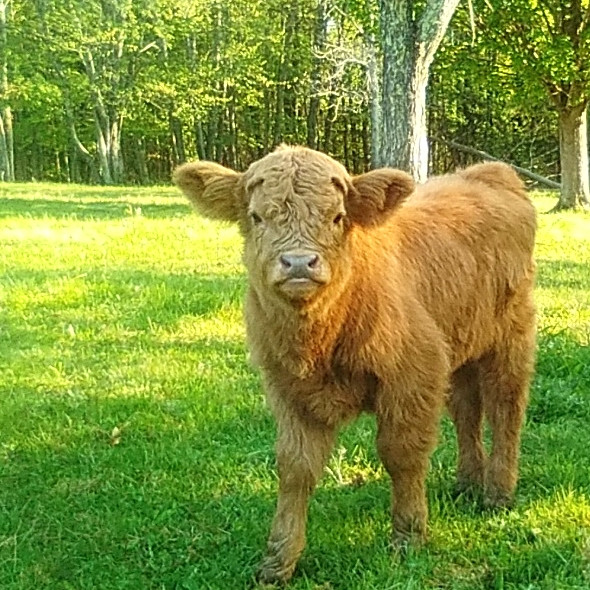To Name A Calf
posted on
May 22, 2021

Ginger is a Miles Smith Farm Scottish Highlander heifer born on May 2. Her name, submitted by reader Mary Powell, was one of over a hundred received. Thanks to everyone who submitted names. Check back as calves are born and given names from these suggestions.
“What’s in a name? That which we call a rose by any other name would smell as sweet,” said Juliet in Shakespeare's “Romeo and Juliet.” Shakespeare had a point, and maybe his naming analogy started at his family's farm at Stratford-upon-Avon in England? I visited his boyhood home long ago and walked around the barnyard where the Shakespeare cows, chickens, and pigs roamed. Did Shakespeare have as much difficulty identifying bovines as I do? Was it Bessie who kicked over the milk pail and Jenny who kicked when being milked or the other way around?
A Number is Not a Name
My point is that names are helpful. My bovines used to be identified by a number. At birth, we’d put ear tags with unique numbers on each calf. The problem was that numbers are not only hard for me to remember, but they also don’t capture personalities. For example, when I think of my husband Bruce, I picture a kind, tolerant man who laughs at my jokes and brings me hot tea when I’m sick. I’d eventually picture this same image if his name were 416, but it wouldn’t be the same.
Naming Isn't Easy
In answer to Juliet, names are important because a name connects to an idea and memories. So for years now, I've been naming all of my cattle. And it gets harder and harder.
When I buy cattle, they usually come pre-named. If I don’t like the name, I’ll change it. Babies born on the farm are nameless. This year we were expecting 12 calves. Two born in early May have names, Ginger and Thunderbolt, but we are waiting for the other 10 to appear. Like an expectant parent, I decided to create a list of potential names and invited you to help: the names poured in. (Thanks!)
Names I Like
Mary Conly sent 72, including Lexington and Otis. Lexington struck me because the first shot of the Revolutionary War was fired on the Lexington green. I also like Otis, a name I associate with that period.
Continuing the military theme, a friend from high school suggested Skylark, the name of Confederate general J.E.B. Stuart’s horse, as well as a kind of Buick, and a song made famous by Ella Fitzgerald.
To give equal time to the North, I’ve added Kangaroo to the list. Kangaroo was Gen. Ulysses Grant’s horse, and even though cows don’t have pouches, I’ll save that name for an energetic calf that hops around more than others.
Spazzolino was suggested by my friend Betsy because she likes the sound of this Italian word for toothbrush. (Shouldn’t it be teethbrush?) I think Spazzolino will add a European elegance to my barnyard ritual of morning greetings. “Hello Spazzolino, would you like some espresso with your alfalfa pellets?”
More Names
Leslie Cooley submitted three other favorites: Bullwinkle, a potential breeding bull, Kermit, which will resonate with a later generation, and Waldo. Mary Pelkey emailed Guthrie, in remembrance of Woody, for a calf with a musical moo, and Bogey, the nickname of Humphrey Bogart, will be applied to a calf with star quality. Preston suggested Festus, a solid name from “Gunsmoke."
Many thanks to all who sent in these names and others still under consideration. You made naming calves fun. Stay tuned as the babies are born. You can meet them and try out their names. They might not smell as sweet as a rose, but it will be fun to ask, “Where’s Waldo?”



